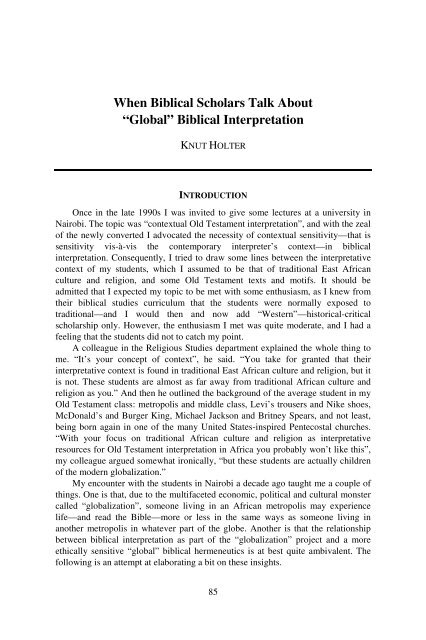Global Hermeneutics? - International Voices in Biblical Studies ...
Global Hermeneutics? - International Voices in Biblical Studies ...
Global Hermeneutics? - International Voices in Biblical Studies ...
Create successful ePaper yourself
Turn your PDF publications into a flip-book with our unique Google optimized e-Paper software.
When <strong>Biblical</strong> Scholars Talk About<br />
“<strong>Global</strong>” <strong>Biblical</strong> Interpretation<br />
KNUT HOLTER<br />
INTRODUCTION<br />
Once <strong>in</strong> the late 1990s I was <strong>in</strong>vited to give some lectures at a university <strong>in</strong><br />
Nairobi. The topic was “contextual Old Testament <strong>in</strong>terpretation”, and with the zeal<br />
of the newly converted I advocated the necessity of contextual sensitivity—that is<br />
sensitivity vis-à-vis the contemporary <strong>in</strong>terpreter’s context—<strong>in</strong> biblical<br />
<strong>in</strong>terpretation. Consequently, I tried to draw some l<strong>in</strong>es between the <strong>in</strong>terpretative<br />
context of my students, which I assumed to be that of traditional East African<br />
culture and religion, and some Old Testament texts and motifs. It should be<br />
admitted that I expected my topic to be met with some enthusiasm, as I knew from<br />
their biblical studies curriculum that the students were normally exposed to<br />
traditional—and I would then and now add “Western”—historical-critical<br />
scholarship only. However, the enthusiasm I met was quite moderate, and I had a<br />
feel<strong>in</strong>g that the students did not to catch my po<strong>in</strong>t.<br />
A colleague <strong>in</strong> the Religious <strong>Studies</strong> department expla<strong>in</strong>ed the whole th<strong>in</strong>g to<br />
me. “It’s your concept of context”, he said. “You take for granted that their<br />
<strong>in</strong>terpretative context is found <strong>in</strong> traditional East African culture and religion, but it<br />
is not. These students are almost as far away from traditional African culture and<br />
religion as you.” And then he outl<strong>in</strong>ed the background of the average student <strong>in</strong> my<br />
Old Testament class: metropolis and middle class, Levi’s trousers and Nike shoes,<br />
McDonald’s and Burger K<strong>in</strong>g, Michael Jackson and Britney Spears, and not least,<br />
be<strong>in</strong>g born aga<strong>in</strong> <strong>in</strong> one of the many United States-<strong>in</strong>spired Pentecostal churches.<br />
“With your focus on traditional African culture and religion as <strong>in</strong>terpretative<br />
resources for Old Testament <strong>in</strong>terpretation <strong>in</strong> Africa you probably won’t like this”,<br />
my colleague argued somewhat ironically, “but these students are actually children<br />
of the modern globalization.”<br />
My encounter with the students <strong>in</strong> Nairobi a decade ago taught me a couple of<br />
th<strong>in</strong>gs. One is that, due to the multifaceted economic, political and cultural monster<br />
called “globalization”, someone liv<strong>in</strong>g <strong>in</strong> an African metropolis may experience<br />
life—and read the Bible—more or less <strong>in</strong> the same ways as someone liv<strong>in</strong>g <strong>in</strong><br />
another metropolis <strong>in</strong> whatever part of the globe. Another is that the relationship<br />
between biblical <strong>in</strong>terpretation as part of the “globalization” project and a more<br />
ethically sensitive “global” biblical hermeneutics is at best quite ambivalent. The<br />
follow<strong>in</strong>g is an attempt at elaborat<strong>in</strong>g a bit on these <strong>in</strong>sights.<br />
85




